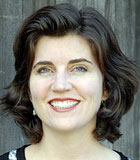 Introduction by Marianne Klekacz
Introduction by Marianne Klekacz Tonight’s guest, Ursula K. Le Guin, is an icon of American literature. This isn’t just my opinion: In 2000, Ursula was awarded “Living Legend” status by the Library of Congress.
Since you’re here tonight, I’m assuming you read the pre-event publicity. If I were to use this time enumerating Ursula’s publications and awards, there would be no time left for her to read, and that would be a great loss to all of us. So instead, I’d like to try to put a little perspective around her body of work.
Had Ursula been writing in a different time, her audience might have been completely different. In the 1950s, fiction of the genres we now call fantasy or science fiction were generally relegated to magazines with names like Amazing Stories or Astounding. Science fiction in particular was generally read by boys and young men that we would now call geeks or nerds. But some things happened that changed all of that, at least in the United States.
In 1957, the Soviet Union launched Sputnik. Sputnik might have been just a “beeping soccer ball” (as it has been described), but it raised a little thrill of fear that the U.S. was falling behind in the technology race. When JFK was elected President in 1960, one of his first major program announcements was his determination to put a man on the moon by the end of the decade. Suddenly space exploration and other worlds were in the forefront of the public’s imagination, opening the door of mainstream literary status to writers like Arthur C. Clarke, Isaac Asimov, Ray Bradbury, and, of course, Ursula K. Le Guin.
Ursula began publishing in the early 1960s. There are two major awards in the science-fiction/fantasy genres. Each year, the Hugo is awarded to the book that readers select as the best; the Nebula is awarded to the book selected as best by writers in the genres. Seldom are both awards won by the same book.
It happened for the first time in 1965 when Frank Herbert’s Dune won both. The next two times it happened, the books selected were by Ursula K. Le Guin: The Left Hand of Darkness in 1969 (coincidentally the year that the U.S. actually did land men on the moon), and The Dispossessed in 1974. It seems to me that Ursula’s books represent what is most thought-provoking and worthwhile in imaginative fiction. They force us to explore what it really means to be human. She has earned her own lecture in The Teaching Company course “Masterpieces of the Imaginative Mind: Literature’s Most Fantastic Works.” Here is how Professor Eric Rabkin summarizes her work:
It seems to me that Ursula’s books represent what is most thought-provoking and worthwhile in imaginative fiction. They force us to explore what it really means to be human. She has earned her own lecture in The Teaching Company course “Masterpieces of the Imaginative Mind: Literature’s Most Fantastic Works.” Here is how Professor Eric Rabkin summarizes her work:
“Le Guin induces us to adopt changes of viewpoint, shaping an aesthetic experience that can change our attitudes toward language, gender, human relations, and personal morality.”
It seems to me that this might be the most important function of literature across the ages.
Please join me in welcoming Ursula K. Le Guin.
Ursula K. Le Guin's website www.ursulakleguin.com.
China Miéville interviews UKL about her life and work for BBC Radio 4, 17 March 2009.











